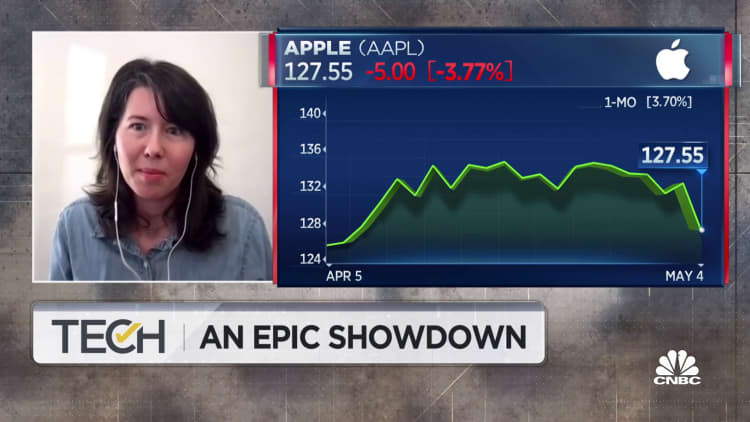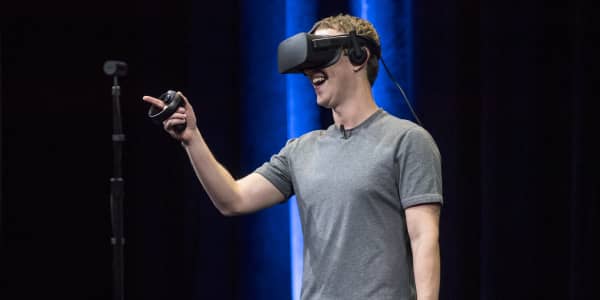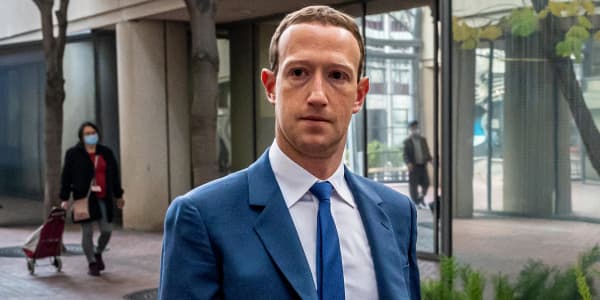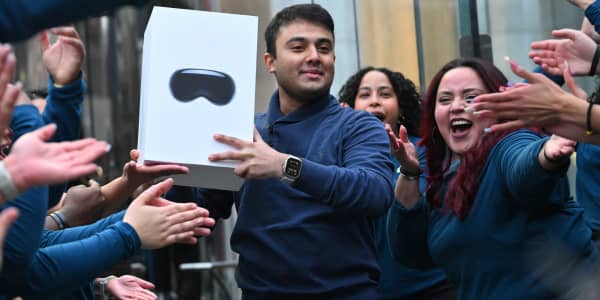Apple and Epic Games have been facing off in one of the most closely watched antitrust trials in the technology industry in years.
Epic Games presented its case this week, and Apple will present its case in the coming weeks. Eventually, Judge Yvonne Gonzalez Rogers will make a decision whether Apple must allow Epic to install its own app store on iPhones and bypass Apple's 30% App Store fee.
As part of Epic's argument that Apple's App Store is anti-competitive, the trial has revealed a lot of internal Apple deliberations on negotiations — court exhibits including email threads fill 60 binders worth of documents — with some of its most important partners.

The documents paint a portrait of a company very aware of its highest-grossing and most important apps, that regularly engages in negotiations with companies including Netflix, Microsoft, Facebook and even Epic Games itself, whose Fortnite game was one of the top apps on Apple's App Store.
While the emails don't show the App Store team compromising on Apple's rules about what's allowed on the store, they did offer other concessions, including front-page placement on the App Store, coordination and publicity through Apple product launches, access to exclusive programming features, and attempts to loop in senior executives to find compromises.
Apple offered compromises to Netflix
In February 2018, an Apple manager met with employees at Netflix and subsequently wrote an email to his colleagues summarizing the meeting.
He wrote that the video streamer was concerned about "voluntary churn," or the number of Netflix subscribers paying through Apple who decided to stop subscribing. Consequently, he said, Netflix wanted to run a test in a few small markets to see what would happen if it stopped accepting in-app purchases, of which Apple takes a 15% to 30% cut.
The Apple manager wrote that Netflix's planned test raised questions for Apple, including whether to take "punitive measures," such as ceasing to promote Netflix on the App Store or escalating concerns to Netflix executives.
The email kicked off a scramble among Apple managers. At the time, Netflix was among the top-grossing apps on Apple's App store.
Pete Distad, an Apple VP focused on Apple's streaming business, dispatched employees to talk to his former employer, Hulu, on similar topics. One Apple employee said that Eddy Cue, Apple's online services chief, wanted to speak with Netflix CEO Reed Hastings.
Over the next two months, Apple employees met with Netflix to talk about the test and updated their bosses about Netflix's plans as Apple tried to schedule an executive meeting, according to the emails.
By July 2018 Apple employees had created a presentation about the Netflix issue. The slide deck included "pie in the sky ideas" which had not been approved, an Apple employee warned.
The slide deck said that Apple had already offered Netflix "custom APIs," or non-public software to allow it to build systems to modify Apple subscriptions, handle free trials or extend auto-renew dates. It also would build features based directly on Netflix requests.
It also pointed out the power of Apple's App Store content, which can drive downloads. It ran its own tests and found that when it promoted Netflix inside its App Store app, download conversions increased by 6% to 7% and said that Netflix got more App Store placements than any other partner, driving 330,000 downloads, or a 2% conversion rate. Apple does not charge for App Store "editorial" content placements.
Finally, the slide deck suggested that Apple could deepen its partnership with Netflix, including using Netflix's commission that Apple collects to buy App Store search ads to drive downloads or bundling Netflix along with Apple services. Another possibility was to offer "video partner program benefits" to Netflix, which sounds similar to a deal Apple has with Amazon Prime Video that allows it to charge customers directly.
Despite Apple's apparent efforts, Netflix discontinued new subscriptions through Apple in December 2018, allowing it to bypass Apple's cut on in-app purchases. The Netflix iPhone app currently opens up to the message: "You can't sign up for Netflix in the app. We know it's a hassle."
Facebook and Apple had a history of conflict
Facebook has had a long conflict with Apple over its desire to put social games in its apps, which conflicts with Apple rules over having collections of apps or software inside apps. Last year, Facebook ramped up its criticism and said that Apple uses its control over its platform to harm developers and consumers.
In one 2011 email exchange posted in a document repository as part of the trial and subsequently removed, Apple executives including former CEO Steve Jobs discussed a compromise over games in the Facebook iPad app after former software chief Scott Forstall talked to Facebook CEO Mark Zuckerberg.
The documents don't show the terms of the compromise. However, when the Facebook iPad app came out in 2011, it included web-based games such as Farmville — bending Apple's rule against app stores on its App Store. But iPhone and iPad users couldn't pay with Facebook's gaming currency, Credits.
Internal Facebook deliberations published as part of the Epic Games trial show how that negotiation affected company relations in the years since then.
In a 2017 email filed as part of court documents, a Facebook employee attached a short analysis ahead of a Facebook executive's meeting with Apple at Allen and Company's annual business conference in Sun Valley.
By then, Facebook wanted clarification or guidance about how to develop "instant games" inside its Facebook Messenger app, which had been slowed by Apple's review process. But the 2011 compromise still loomed large.
"In late 2016 Apple approved Facebook to move forward with putting 'Instant Games' in Messenger and the FB Blue App," the Facebook employee wrote. "[Former Apple marketing chief] Phil Schiller pulled out an email from 2011 which memorialized an agreement we made allowing FB to stream HMTL5 games as long as we don't create an app store or do in-app payments."
The outcome of the Sun Valley meeting is unclear from court documents, but by 2020 Facebook was fighting with Apple's review process again over a standalone gaming app. After one Apple rejection in March 2020, a Facebook employee described in emails frustration with the process and said that it "comes as a surprise given that FB Gaming includes no unique functionality that hasn't already been approved in the Games Tab inside the Facebook App."
Facebook, according to the emails, was required to go through the same appeals process as every other developer, including appealing to an Apple body called the App Review Board. However, the social media giant was able to schedule calls with Trystan Kosmynka and Bill Havlicek, leaders of Apple's review group, and later, Ron Okamoto, who was the VP in charge of the group before he retired this year.
When Facebook Gaming was eventually released in late 2020, it was clear that Facebook and Apple could not find a compromise.
"Unfortunately, we had to remove gameplay functionality entirely in order to get Apple's approval on the standalone Facebook Gaming app — meaning iOS users have an inferior experience to those using Android," Sheryl Sandberg, Facebook's COO, said in a statement at the time.
Microsoft was negotiating about Office for iPad in 2012
An email thread from 2012 shows that top Apple executives, including Schiller and Cue, were informed of Microsoft's impending launch of Microsoft Office for iPhones and iPads.
Okamoto, who at the time was an Apple VP focusing on developer relations, met with Microsoft. His email to his bosses says that Apple wanted to know if Microsoft could participate in its annual developer's conference, WWDC. (Microsoft declined, saying it wouldn't be ready to talk about its plans yet.)
Microsoft had two requests. First, it wanted Apple to let it redirect users to the Microsoft website for in-app purchases. Microsoft would handle the payment, evading Apple's 30% charge for in-app purchases.
Second, it wanted Schiller and Cue to meet with Microsoft counterparts, in particular, Kirk Koenigsbauer, who is a current Microsoft senior vice president.
Schiller said yes to the meeting but poured cold water on Microsoft's payment proposal in an email. "We run the store, we collect the revenue."
Microsoft did not end up releasing Office for the iPad until 2014, after Satya Nadella took over for Steve Ballmer as the company's CEO.
Epic Games and Marshmello
Before Apple removed Epic's shooter game Fortnite from the App Store, it was a top-grossing app on the store, and employees from both companies worked to seal cross-promotion deals, court filings reveal.
Epic provided demos at Apple launch events highlighting new technology, quotes about Apple gaming features, and heads-up about its big events and promotions inside Fortnite.
In exchange, Epic Games got promotion for Fortnite through the Apple App Store as well as through other Apple media properties such as Apple Music. It also used its relationship with Apple employees to get a Fortnite ripoff kicked off the App Store.
One 2019 Epic Games email includes employees talking about a 2019 concert inside the Fortnite game featuring Marshmello, a DJ.
Apple wanted to partner — but only after making sure Marshmello's mix wouldn't have curse words — the emails say, and included a proposal for cross-promotion with Apple's Apple Music brand, including billboards in New York and Los Angeles, digital advertising and posts from Apple's social media accounts.
Apple needed permission to use the Fortnite name in its Apple Music playlists and ads, but Epic employees were waffling. One worried that Apple was "co-opting and drafting" in Epic's wake.
Another employee pointed out the benefits to Epic Games, including that the company wanted Apple to sponsor future Fortnite events and that they saw big opportunity for the game's growth among iPhone players.
Plus, "Apple commercials are always tasteful and cool," an Epic employee wrote. "They wouldn't do something sh---y with this."
Apple seemed particularly interested in getting Epic Games to support ARKit, software for iPhones that uses its 3D-sensing hardware to integrate the real world and computer graphics.
Epic emails from 2017 discussed a meeting with Apple to integrate the iPhone's face tracking to create animated characters.
The partnership between the two companies extended through 2020. Shortly after Apple released a high-end iPad model with a new 3D scanner, an Apple employee offered Epic Games a meeting with Apple's ARKit team that made the software for it and later dangled the possibility of promotion at its annual developer conference.
In 2018, after Fortnite had been released and had gained momentum, Epic Games co-founder Mark Rein replied to an email, asking, "[I]s there anything we can do so Apple could get behind us in a major way?"
Rein said he had a February meeting with Apple already scheduled and that Apple was "VERY" interested in seeing the smartphone version of Fortnite.
Apple had promoted Fortnite since 2015, when an early version of the game was demonstrated on-stage playing on a Mac at Apple's WWDC conference.
However, the relationship between the two companies didn't mean that the negotiations ever got to the level of Apple CEO Tim Cook. In 2015, weeks after Epic Games presented at an Apple event, Epic Games CEO Tim Sweeney sent an email to Cook complaining about the App Store's rules, in a preview of Epic's arguments currently being hashed out in court.
Cook asked his lieutenants: "Is this the guy that was at one of our rehearsals?"





